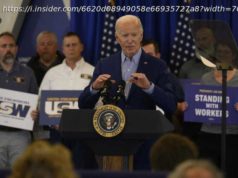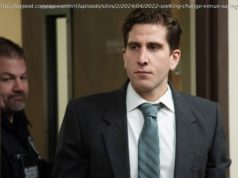A 69-year-old, banjo-playing Democrat looks to shock American politics Thursday night after one of the wildest House races in memory.
A wild, bitterly contested special election for Montana’s lone congressional seat will come to a close on Thursday night — just one day after Republican candidate Greg Gianforte was charged with assaulting a reporter. The seat opened up after President Donald Trump appointed former Rep. Ryan Zinke as his interior secretary. Democrat Rob Quist, well known across the state for his banjo playing but facing criticism over a checkered history of failed debt payments, is looking for an upset in a state Trump won by 20 points this fall. Polls across the state are expected to close at 8 pm Montana time (10 pm EST) . If you’ re on the East Coast and eager to learn the results, it may make more sense to just wait until tomorrow morning. As the New York Times’s Nate Cohn writes, it could be well after the polls close before we get a final victory. If you (like us!) are staying up until the ballots are counted, check back here for updates. Montana is also posting. And for live analysis, three of the best Twitter accounts you can follow for election night are, the and. In the meantime, here’s a brief guide to the two main candidates in the race — as well as what the outcome may mean for the national political scene as Democrats look for their first election win of the Trump era. Even though the Montana race may have consequences for evaluating the national political landscape, the outcome may be just as shaped by the personalities and personal eccentricities of the candidates themselves. Quist, 69, is renowned at home as a founding member of the Mission Mountain Wood Band (M2WB) . Attacked by his opponents as a Quist has praised Bernie Sanders and made affordable health care and defending public lands the centerpieces of his campaign. He’s well known in the state for his music, which leads to headlines about “the poet” running for Congress and allows Quist to get away with campaign lines like, “I’ ve really been representing Montana through my music and poetry all my life.” More recently, Quist has come under a barrage of criticism for his personal financial history. In 2013, he was sued by Mission Mountain Wood Band bassist Steve Riddle for breach of contract. In May, the Associated Press that Montana filed three tax liens to collect about $15,000 in back taxes from Quist. A subsequent AP report showed that he — an on immediately. Still, it’s not as if Quist’s opponent comes through as a squeaky-clean candidate, either. Gianforte, 56, was born in California, educated in Pennsylvania and New Jersey, and only came to Montana in 1995. After moving to Montana, Gianforte in a stream that ran by his property. As The Huffington Post, Gianforte ran for governor and lost to Gov. Steve Bullock (D-MT) in 2016. In the process, he spent more than $5 million of his own money in a failed gubernatorial bid. That was good for airing 30,661 television ads — more than that of any other state candidate in history, a staggering figure in such a small state. Gianforte’s career has led Quist to seek inroads with voters by portraying his opponent as a corporate stooge. “The other choices we’ re offered are really connected to corporate America, which in a lot of ways has undue influence on the politics of our country, ” Quist . “My goal is to be a strong, independent voice for the people of Montana.” In 2016, House Democrats didn’ t just face the obstacle of gerrymandering when going up against the GOP. They in red but achievable districts, including someone who had been unemployed for the past six years and a beekeeper with no elected experience. The special elections held so far — including Democrats’ surprisingly strong showings in Georgia and Kansas — have helped encourage better Democratic candidates to throw their hats into the ring. Another surprisingly close race could indicate that Republicans face a rough map in 2018, which may encourage more qualified Democratic candidates to enter local races. “If the general feeling is that it represents a warning sign for Republicans, that has strong implications for whether Democratic candidates jump in for 2018, ” said Dave Hopkins, a Boston College political scientist. And the reverse effect also holds: If Republicans sense they’ re in for a rough reelection bid, then vulnerable Republican incumbents will race toward the exits — creating more opportunities for House Democrats. “There’s a self-fulfilling prophecy here, as incumbents consider retirement thinking they’ ll face a tough race, which in turn makes the field tougher for Republicans, ” Hopkins said. We’ re already getting signs that this trend is underway, with the unexpected of Rep. Ileana Ros-Lehtinen (R-FL) in a competitive Florida House seat. A scare for the GOP in Montana would accelerate it. Similarly, on Capitol Hill, the Montana race put Republicans’ legislative agenda on ice. In particular, the Montana race may reveal the extent to which Republicans embrace House Speaker Paul Ryan’s American Health Care Act at their own political peril. On the campaign trail, Quist has responded to his personal travails by emphasizing the horror of the Republican health care bill. Last week, he hosted a series of “Hands Off Our Health Care” events around the state. His rallies around the state with Sanders were billed as attempts His last ad buy, “Preexisting, ” goes after Republicans for ending the Affordable Care Act’s protections for patients with preexisting conditions: There’s a good reason for Quist’s team to go after the AHCA rather than Trump: The president remains popular in Montana. Meanwhile, the Medicaid expansion under Obamacare covered 70,000 Montanans, the AHCA is polling in the mid-20s nationally, and the approval rating of Obamacare is. Gianforte, meanwhile, has mostly ducked questions about his support for Ryan’s health care bill. A tape obtained by the New York Times that Gianforte had praised the bill behind closed doors, but has said he wouldn’ t of a lack of “data.” The “data” that came out on from the Congressional Budget Office, which conducts official analysis of bills, looked bad — an estimated 23 million more Americans would be uninsured in 10 years than under current law, as well grim outcomes for patients with preexisting conditions.






